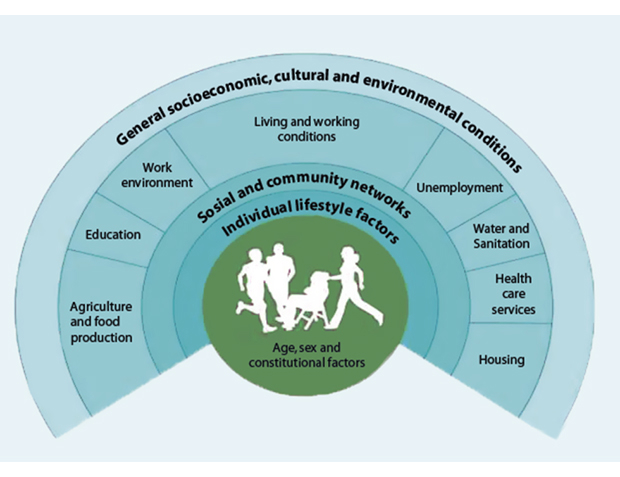4 A more health-promoting society
The government will base the new public health policy on the premise that public health will be taken into consideration in all policies, and that good conditions for promoting health and well-being will be created. The principle of health in all policies involves more than the health policy alone – it also involves the development of health-promoting policies in all sectors.
Determinants of health can be presented in a causal chain, which extends from general social conditions to individual characteristics. This is illustrated in Figure 3.2. At the start of the causal chain are general social conditions such as economic development, environmental conditions, and political governance. Next in the chain are living and working conditions and social conditions such as social capital, as well as networks and relationships. Towards the front of the chain are individual lifestyles and health-related behaviours that have a more immediate impact upon health, but which are also shaped by conditions within society and the environment.
The overall health situation of a local municipality, county, or country is not simply the sum of individual choices and genetic factors. There are broad geographical and social inequalities in health. Societal conditions create these inequalities – inequalities which we can influence through planning, management, and initiatives. The population’s health and social inequalities are closely related to welfare developments and differences in living conditions and income. Norway has a well-functioning civil society with high levels of participation in voluntary work, a diverse culture and generally high level of well-being. Norwegian society is characterised by a high level of trust between the country’s citizens, authorities, and democratic institutions.

Figure 4.1 Determinants of health1
1 Dahlgren, G., Whitehead, M. (1991). Policies and strategies to promote social equity in health. Stockholm: Institute of Futures Studies
The government’s policy for the further development of the universal welfare is one of the main ways in which a sense of social community and inclusion can be strengthened. This is also recommended in a report on social exclusion published by the World Health Organization. The Norwegian welfare model makes a considerable contribution to ensuring that there is a high level of labour force participation. There is good access to free education, unemployment is low, social security is good and cultural activities are accessible to most people. Policies to promote equality and combat discrimination also help to promote inclusion. The public health policy shall build upon the Norwegian welfare model with universal schemes for kindergartens, education and health services, employment initiatives, an accessible cultural policy, and active collaboration with and support for the voluntary sector. In addition, consideration for public health shall take greater precedence in municipal and regional development, industrial policy, local community efforts, and transport and communication policy. The health of the population and how well health is distributed shall be given greater attention in the planning of a more health-promoting society. In order to prevent lifestyle diseases, it will be strategically important to make healthy choices more readily available and limit the accessibility of unhealthy products. Initiatives targeted towards children and young people shall be prioritised.
Textbox 4.1 A more health-promoting society
The government will:
Continue its policy towards an equitable society and prevent children from living under poor living conditions and low incomes
Submit a White Paper to Parliament on the living conditions of individuals with disabilities
Submit a White Paper to Parliament on gender equality from a life course, ethnicity, and class perspective
Help to raise awareness and increase knowledge of the relationship between social support, social capital, and health
Help to make sure that public health considerations are given greater precedence in the development of local environments and communities
Present a strategy for active outdoor lifestyles that will facilitate outdoor activities for everyone and outdoor activities in the local community. Help to ensure that outdoor recreation areas across the country are mapped and valued
Continue and further develop measures to protect and develop particularly important outdoor recreation areas by prioritising this in the local community
Place more emphasis on preserving important green areas for recreation and outdoor activities near residential areas
Work to provide more environmentally friendly and healthier transport and transport solutions through the National Transport Plan Follow-up the consultation with proposals for national targets for water in order to implement the World Health Organization and UNECE’s Protocol on Water and Health
Work to introduce a ‘smiley programme’ in the hospitality industry
Implement EU’s new food information programme with more stringent requirements for the labelling of nutritional content and country of origin
Invite the hospitality industry to collaborate on the possible introduction of the labelling of the energy and nutritional content in foods and drinks
Aim to create a national centre for nutrition, physical activity and health in kindergartens and schools in order to contribute to increased well-being and concentration, and to strengthen students’ ability to learn
Create a cross-sectoral group of experts in order to summarise knowledge of antibiotics and antibiotic resistance
Develop better management data for the operation and maintenance of public buildings
Review environmental health regulations and further develop environmental health management in line with the Public Health Act
Maintain a long-term ambition to expand the programme for free fruit and vegetables to all students in primary and secondary schools
Consider how the school day can be organised so that students get at least one hour of physical exercise every day
Implement a physical activity campaign to increase the population’s understanding of the importance of physical activity and the health consequences of physical inactivity, as well as increase awareness of what is necessary in order to achieve health benefits for the individual
In future budgets, evaluate whether it is possible to reorient health-related excise duties in a manner that contributes to improved public health
Further develop and follow-up tobacco prevention work through a National strategy to combat harm caused by the consumption of tobacco 2013 – 2016
Further develop and follow-up an alcohol policy based on pricing initiatives and regulations to restrict availability, cf. White Paper no. 30 (2011 – 2012)
Collaborate with the food industry and retail companies with the aim of entering into a binding agreement for the regulation of marketing of unhealthy foods and beverages to children and young people, and if this is not possible, introduce legislation against such marketing

Figure 4.2